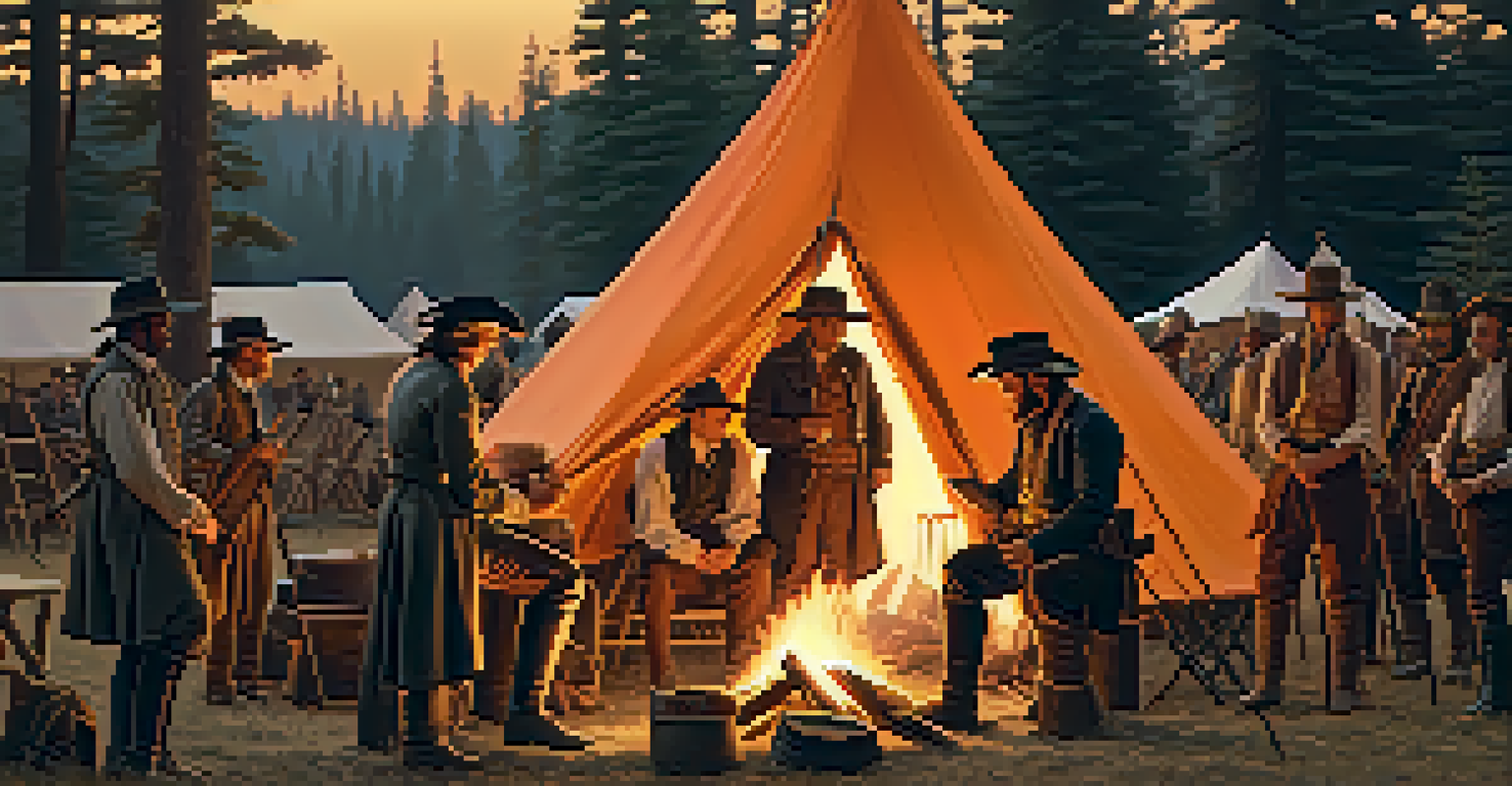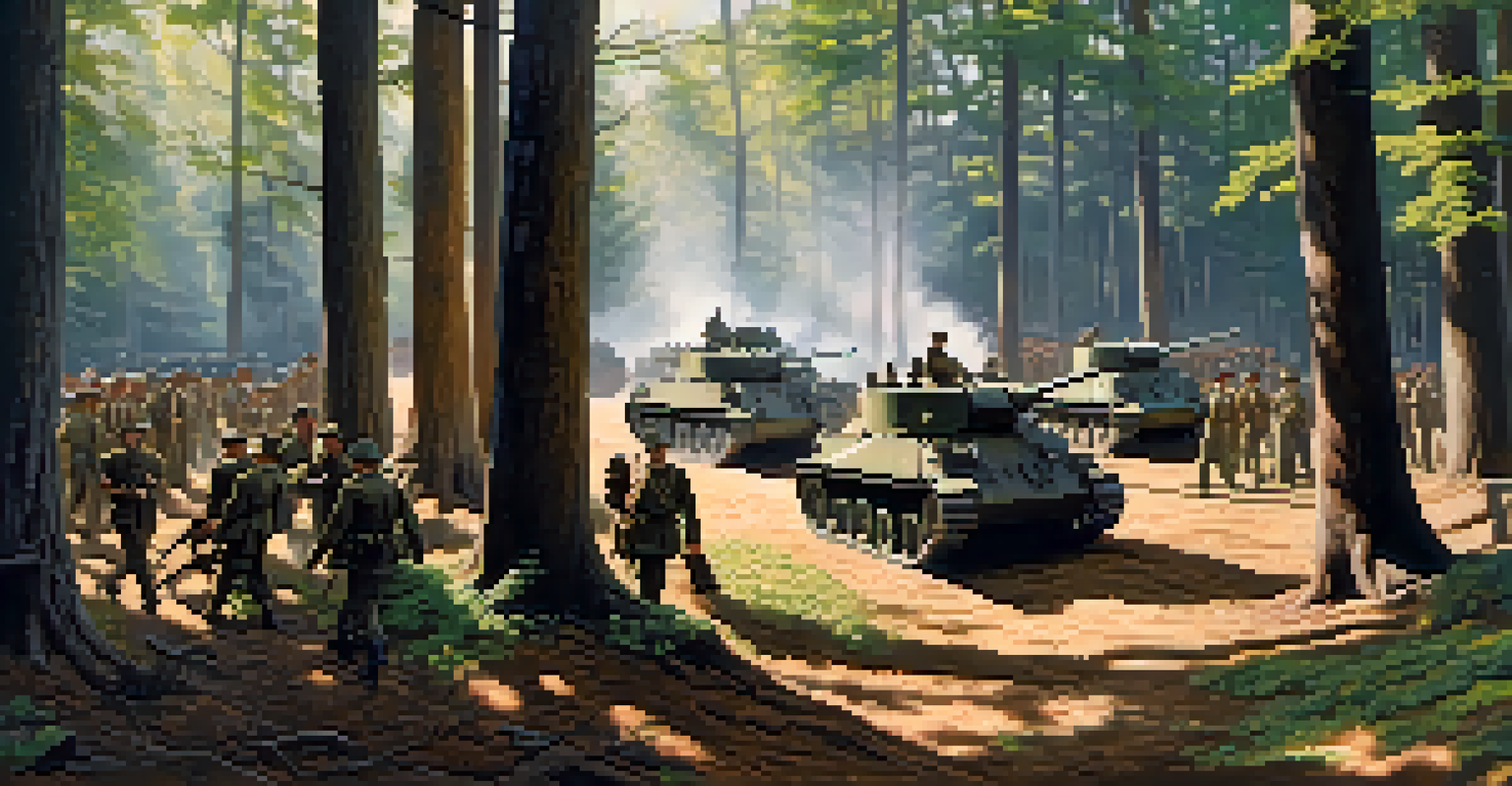The Psychology Behind Historical Reenactment Participation

Understanding the Appeal of Historical Reenactments
Historical reenactments attract participants for various reasons, often rooted in a deep fascination with the past. Many individuals find joy in immersing themselves in a different time, experiencing history firsthand rather than just reading about it. This engaging approach allows participants to connect emotionally with historical events, making the past feel more relevant and alive.
History is not a burden on the memory but an illumination of the soul.
For some, reenactment serves as a way to honor their ancestors or cultural heritage. By actively participating in these events, individuals pay tribute to those who lived through significant historical moments. This sense of connection can foster a feeling of belonging within a community that shares similar values and interests.
Additionally, the thrill of embodying a character from history can be incredibly appealing. Participants often enjoy the creative aspect of crafting their costumes and learning about the historical context, which can be both educational and entertaining. This blend of creativity and learning enhances the overall experience, making it unforgettable.
Community and Social Bonds in Reenactments
One of the most significant aspects of historical reenactments is the sense of community they foster. Participants often come together, forming friendships that transcend geographical boundaries and age differences. These social bonds can provide a strong support system, as everyone shares a common interest in history and reenactment.

Reenactment events often encourage teamwork, whether through group battles or collaborative storytelling. This teamwork builds camaraderie and reinforces relationships, allowing participants to share experiences and create lasting memories. The collaborative nature of these events can lead to a profound sense of belonging and mutual respect among participants.
Connection to History and Heritage
Historical reenactments allow participants to immerse themselves in the past, honoring their ancestors and fostering a sense of community.
Moreover, the community aspect often extends beyond the reenactment itself. Many groups organize regular meetings, workshops, and social gatherings, which further strengthen these connections. Participants often look forward to these events as a way to unwind, learn, and bond with like-minded individuals.
The Educational Value of Historical Reenactments
Participating in historical reenactments provides a unique educational experience. Unlike traditional classroom settings, reenactments allow individuals to engage with history in a dynamic and interactive way. This hands-on approach can significantly enhance understanding and retention of historical facts and events.
The past is never dead. It's not even past.
Reenactors often immerse themselves in research to accurately portray their characters, which deepens their knowledge of the time period. This commitment to authenticity encourages participants to explore various aspects of history, from social customs to military strategies. As a result, they become more informed and passionate about the subject matter.
Furthermore, reenactments can ignite curiosity in spectators, sparking interest in history among those who might not have previously engaged with it. By witnessing history come to life, audiences may be inspired to learn more, leading to a greater appreciation for the past and its impact on the present.
Psychological Benefits of Participation
Engaging in historical reenactments can have several psychological benefits for participants. The immersive experience allows individuals to escape from the stresses of modern life, offering a form of recreational therapy. This temporary reprieve can lead to improved mental well-being and increased happiness.
Additionally, reenactment can provide a sense of accomplishment and purpose. Mastering a new skill, such as combat techniques or period crafts, can boost self-esteem and confidence. Participants often take pride in their ability to authentically portray their characters, which can be incredibly fulfilling.
Educational and Psychological Benefits
Engaging in reenactments provides a dynamic learning experience while also enhancing mental well-being through social interaction and personal achievement.
Moreover, the social interactions that occur during events can alleviate feelings of loneliness or isolation. By connecting with others who share similar interests, participants can develop meaningful friendships, enhancing their overall emotional health and resilience.
The Role of Authenticity in Reenactment
Authenticity is a cornerstone of historical reenactment, as participants strive to portray their characters as accurately as possible. This pursuit of authenticity can lead to a deeper appreciation for the complexities of history and the lives of those who lived it. By understanding the nuances of their characters, reenactors gain insights into different perspectives and cultures.
However, the pressure to maintain authenticity can also create challenges. Participants may struggle with balancing historical accuracy and personal interpretation, leading to discussions about what constitutes 'real' history. This dialogue can enrich the reenactment community by encouraging critical thinking and a broader perspective on history.
Ultimately, the quest for authenticity fosters a deeper connection to the past. As participants embrace the challenges and rewards of accurately portraying history, they cultivate a greater respect for the intricacies of human experience, both past and present.
Reenactment as a Form of Personal Expression
Historical reenactments offer a unique platform for personal expression. Participants can explore their creativity through costume design, character development, and storytelling. This artistic outlet allows individuals to showcase their interpretations of history in a way that feels personal and meaningful.
By embodying a character, reenactors can express their values and beliefs, often reflecting on contemporary issues through the lens of history. This intersection of past and present can lead to powerful discussions about identity, culture, and human behavior. Through their performances, participants can engage with audiences on a deeper level.
Authenticity and Personal Expression
The pursuit of authenticity in reenactments encourages deeper appreciation of history and allows participants to express their creativity and values.
Additionally, this form of expression can be therapeutic, providing a safe space for individuals to explore emotions and experiences. The act of stepping into another time can help participants process their feelings and gain new perspectives on their own lives.
Challenges Faced by Reenactors
While historical reenactments can be rewarding, participants often face various challenges. One common issue is the financial burden associated with creating and maintaining authentic costumes and gear. For many, this investment can be significant, leading to stress or concern about affordability.
Furthermore, the commitment required for participation can be time-consuming. Researching historical accuracy, attending events, and honing skills demand significant dedication, which can be overwhelming for some. Balancing these responsibilities with personal and professional life can be a constant struggle.

Lastly, participants may encounter disagreements within the community regarding historical interpretation or event organization. While these discussions can be constructive, they can also lead to conflicts that may discourage individuals from fully engaging in reenactment activities. Navigating these challenges is an essential part of the reenactment journey.